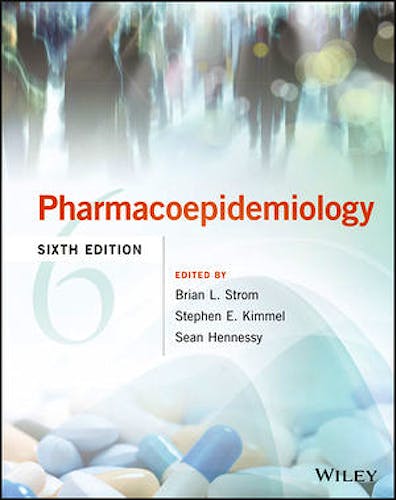

No hay productos en el carrito



Pharmacoepidemiology
Strom, B. — Kimmel, S. — Hennessy, S.
6ª Edición Noviembre 2019
Inglés
Tapa dura
1248 pags
2300 gr
19 x 24 x 6 cm
ISBN 9781119413417
Editorial WILEY
LIBRO IMPRESO
-5%
306,55 €291,22 €IVA incluido
294,76 €280,02 €IVA no incluido
Recíbelo en un plazo de
2 - 3 semanas
LIBRO ELECTRÓNICO
-5%
262,07 €248,97 €IVA incluido
251,99 €239,39 €IVA no incluido
Acceso On Line
Inmediato
Contributors
Preface
Acknowledgments
Part I Introduction
1. What Is Pharmacoepidemiology?
Brian L. Strom
2. Basic Principles of Clinical Pharmacology Relevant to Pharmacoepidemiologic Studies
Jeffrey S. Barrett
3. Basic Principles of Clinical Epidemiology Relevant to Pharmacoepidemiologic Studies
Brian L. Strom
4. Sample Size Considerations for Pharmacoepidemiologic Studies
Brian L. Strom
5. When Should One Perform Pharmacoepidemiologic Studies?
Brian L. Strom
Part II The Role of Pharmacoepidemiology in Different Sectors
6. The Role of Pharmacoepidemiology in the Healthcare System and Academia
Joshua J. Gagne and Jerome Avorn
7. The Role of Pharmacoepidemiology in Industry
Nicolle M. Gatto, Rachel E. Sobel, Jamie Geier, Jingping Mo, Andrew Bate, and Robert F. Reynolds
8. The Role of Pharmacoepidemiology in Regulatory Agencies
Gerald J. Dal Pan, June Raine, and Shinobu Uzu
9. Pharmacoepidemiology and the Law
Aaron S. Kesselheim and Kerstin N. Vokinger
Part III Sources of Data for Pharmacoepidemiology Research [editor SH]
Part IIIa Spontaneous Reporting
10. Postmarketing Spontaneous Pharmacovigilance Reporting Systems
Gerald J. Dal Pan, Marie Lindquist, and Kate Gelperin
Part IIIb Electronic Data Systems
11. Overview of Electronic Databases in Pharmacoepidemiology
Brian L. Strom
12. Encounter Databases
Tobias Gerhard, Yola Moride, Anton Pottegård, and Nicole Pratt
13. Electronic Health Record Databases
Daniel B. Horton, Harshvinder Bhullar, Lucy Carty, Francesca Cunningham, Alexis Ogdie-Beatty, Janet Sultana, and Gianluca Trifirò
14. Inpatient Databases
James A. Feinstein, Peter K. Lindenauer, Chris Feudtner, and Brian T. Fisher
Part IIIc Studies Involving Ad Hoc Data Collection
15. Event Monitoring in the UK
Vicki Osborne and Saad A.W. Shakir
16. Primary Data Collection for Pharmacoepidemiology
Nancy A. Dreyer, Ana Filipa Macedo, and Priscilla Velentgas
Part IIId Choosing a Data Source
17. Choosing among the Available Data Sources for Pharmacoepidemiology Research
Brian L. Strom
Part IV Selected Applications of Pharmacoepidemiology
18. Studies of Drug Utilization
Björn Wettermark, Vera Vlahovic-Palcevski, David Lee, and Ulf Bergman
19. Evaluating and Improving Physician Prescribing
Christine Y. Lu, Sumit R. Majumdar, Helene Lipton, and Stephen B. Soumerai
20. Pharmacoepidemiologic Studies of Vaccine Safety
Robert T. Chen, Jason M. Glanz, and Tom T. Shimabukuro
21. Epidemiologic Studies of Medical Devices: Methodologic Considerations for Implantable Devices
Danica Marinac-Dabic, Sharon-Lise Normand, Art Sedrakyan, and Thomas P. Gross
22. Research on the Effects of Medications in Pregnancy and in Children
Daniel B. Horton, Sonia Hernandez-Diaz, Tamar Lasky, and Krista F. Huybrechts
23. Study of Biologics
Jeffrey R. Curtis and James D. Lewis
24. Risk Management
Claudia Manzo, Emil Cochino, Lubna Merchant, and Giampiero Mazzaglia
25. Distributed Networks of Databases Analyzed Using Common Protocols and/or Common Data Models
Sengwee Toh, Nicole Pratt, Olaf Hendrik Klungel, Joshua J. Gagne, and Robert W. Platt
26. Comparative Effectiveness Research
Soko Setoguchi and Ian Chi Kei Wong
27. Data Mining and Other Informatics Approaches to Pharmacoepidemiology
Andrew Bate, Gianluca Trifirò, Paul Avillach, and Stephen J.W. Evans
28. Pharmacoepidemiology Research on Drugs of Abuse
Jana McAninch, Alex Secora, Cyndy Kornegay, and Judy Staffa
Part V Selected Special Methodologic Issues in Pharmacoepidemiology
29. Assessing Causation from Case Reports
Judith K. Jones, Bernard Bégaud, and Elyse Kingery
30. Molecular Pharmacoepidemiology
Christine Y. Lu and Stephen E. Kimmel
31. Bioethical Issues in Pharmacoepidemiologic Research
Laura E. Bothwell, Annika Richterich, and Jeremy Greene
32. The Use of Randomized Controlled Trials in Pharmacoepidemiology
Robert F. Reynolds, Samuel M. Lesko, Nicolle M. Gatto, Tjeerd P. van Staa, and Allen A. Mitchell
33. The Use of Pharmacoepidemiology to Study Beneficial Drug Effects
Brian L. Strom and Kenneth L. Melmon
34. Pharmacoeconomics: The Economics of Pharmaceuticals
Kevin A. Schulman
35. Benefit–Risk Assessments of Medical Treatments
Bennett Levitan, Rachael L. DiSantostefano, and Scott Evans
36. The Use of Metaanalysis in Pharmacoepidemiology
Jesse A. Berlin, Brenda J. Crowe, H. Amy Xia, and Stephen J.W. Evans
37. Validity of Drug and Diagnosis Data in Pharmacoepidemiology
Mary Elizabeth Ritchey, Suzanne L. West, and George Maldonado
38. Studies of Medication Adherence
Julie Lauffenburger, Trisha Acri, and Robert Gross
39. Risk Evaluation and Communication
Susan J. Blalock, Rebecca Dickinson, and Peter Knapp
40. Methods for Studying the Health Effects of Drug–Drug Interactions
Sean Hennessy, Charles E. Leonard, Joshua J. Gagne, James H. Flory, Colleen M. Brensinger, and Warren B. Bilker
41. The Pharmacoepidemiology of Medication Errors
Hanna M. Seidling and David W. Bates
42. Patient Engagement and Patient-Reported Outcomes
Esi M. Morgan
43. Advanced Approaches to Controlling Confounding in Pharmacoepidemiologic Studies
Sebastian Schneeweiss and Samy Suissa
Part VI Conclusion
44. The Future of Pharmacoepidemiology
Brian L. Strom, Stephen E. Kimmel, and Sean Hennessy
Appendix A Sample Size Tables
Appendix B Glossary
Index
This classic, field-defining textbook, now in its sixth edition, provides the most comprehensive guidance available for anyone needing up-to-date information in pharmacoepidemiology. This edition has been fully revised and updated throughout and continues to provide a rounded view on all perspectives from academia, industry and regulatory bodies, addressing data sources, applications and methodologies with great clarity.
Brian L. Strom is Chancellor, Rutgers Biomedical and Health Sciences and Executive Vice President for Health Affairs, Rutgers University.
Stephen E. Kimmel is Professor of Medicine and Director of the Division of Epidemiology, University of Pennsylvania Perelman School of Medicine.
Sean Hennessy is Professor of Epidemiology and Director of the Center for Pharmacoepidemiology Research and Training, University of Pennsylvania Perelman School of Medicine.
© 2026 Axón Librería S.L.
2.149.0